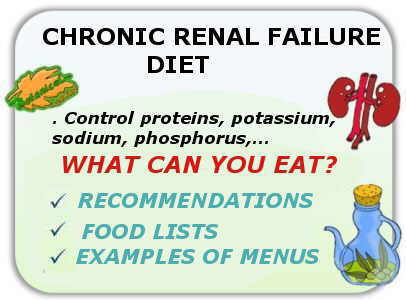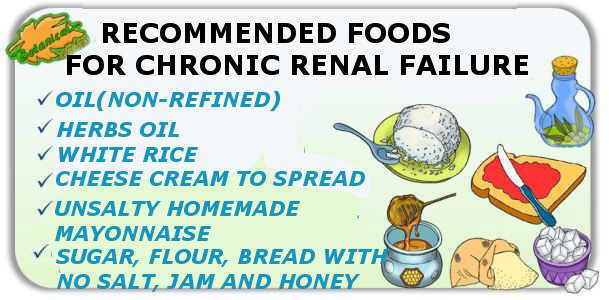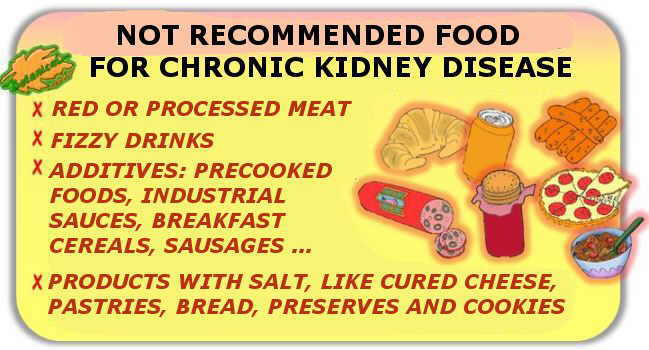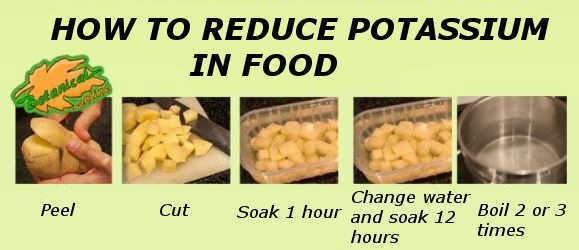Reversing Kidney Disease Vegetarian Diet
Contents
- 1 Suitable food for CKD
- 1.1 GUIDE TO DIETOTHERAPY FOR CHRONIC KIDNEY INSUFFICIENCY
- 1.2 Nutritional treatment for severe kidney failure
- 1.3 Check with your doctor
- 1.4 Is it necessary to eat a strict diet from the beginning of illness?
- 1.5 GENERAL GUIDELINES FOR PRESERVING THE KIDNEYS FUNCTION
- 1.6 How serious is kidney failure?
- 1.7 STRICT DIET FOR RENAL INSUFFICIENCY
- 1.8 Dietary guidelines for Chronic Kidney Disease
- 1.9 How should the diet for strict CFR be?
- 1.10 Importance of diet in renal failure
- 1.11 Anemia in chronic renal failure (CRF)
- 1.12 How many calories should be taken in advanced kidney disease?
- 1.13 What foods can be consumed to fill these calories?
- 1.14 Recommended foods for CKD
- 1.15 What foods are NOT suitable for chronic kidney disease?
- 1.16 Control of proteins in chronic renal failure
- 1.17 Phosphorus control in renal disease
- 1.18 How much liquid can you drink in chronic kidney disease?
- 1.19 Controlling potassium in chronic kidney disease
- 1.20 How to Remove Potassium from Vegetables
- 1.21 Control of sodium or salt
- 1.22 Supplements for chronic kidney failure
- 1.23 Depression and chronic kidney disease
- 1.24 Recommendations for chronic renal failure
- 1.25 How to implement all these tips?
Suitable food for CKD
GUIDE TO DIETOTHERAPY FOR CHRONIC KIDNEY INSUFFICIENCY
Nutritional treatment for severe kidney failure
Chronic renal failure (CRF), also called Chronic kidney disease (CKD) is a chronic or irreversible disease characterized by progressive loss of renal function. During its evolution, there is a loss of kidney's capacit) to filter blood, minerals, proteins and dietary fluids.
Feeding plays a key role in the management of CRF, being a determining factor for preserving renal function and avoiding complications of the disease. This article is the first page of a small practical guide on feeding for the renal patient.

It is common for people with CKD not to know what they can eat, due to the numerous restrictions of the diet
Check with your doctor
According to Cochrane's (2017) latest review on diet and chronic kidney failure, it appears that healthy diet and lifestyle are beneficial for CRF.
The healthiest eating patterns for this disease are those rich in vegetables and plant proteins (tofu, vegetables, unsalted nuts).
On the other hand, the diet should be strict when there are altered levels of electrolytes, such as hyperkalemia( elevated level of potassium in the blood) /or hyperphosphataemia (abnormally elevated level of phosphate in the blood)
Is it necessary to eat a strict diet from the beginning of illness?
There is no evidence that a very strict diet (controlled in minerals) can prevent the alterations of electrolytes in blood before they appear. Therefore, at the beginning, the dietary recommendations for people with chronic renal failure would be:
GENERAL GUIDELINES FOR PRESERVING THE KIDNEYS FUNCTION
- Healthy diet: type Mediterranean diet or DASH diet, with plenty of vegetables, nuts (without salt), with the presence of vegetable proteins (tofu, lentils, etc.). It may possibly be beneficial to eat turmeric and other sources of antioxidants.
- Control the amount of protein that is ingested: eating too much protein foods accelerates kidney disease
- Walking 1 hour a day: a healthy lifestyle is beneficial for chronic kidney failure.
- Control potassium: initially it is only necessary to avoid using many aromatic herbs (which are the richest foods in potassium) and avoid combining many foods rich in potassium.
- Avoid: foods with a lot of salt, eating too much protein foods (like meat, fish,…), red meat, toxic (tobacco, alcohol),
- Phosphorus and sodium: It is recommended to control phosphorus and sodium (salt).
You should not always carry out strict diets controlling potassium and fluids. Your doctor has to tell you if necessary.
The right diet for kidney failure is under continuous investigation. In the early stages of the disease, a suitable vegetarian diet rich in boiled vegetables seems to be advisable. However, in advanced stages, the ingestion of potassium should be controlled. Consult your nephrologist for advice that should be followed, according to the latest scientific studies.
How serious is kidney failure?
It is necessary to know in which stage of chronic renal failure we are to establish the degree of rigidity of the recommendations. In advanced stages of the disease, feeding patterns must be very strict. However, in the initial stages, it is possible to be a little more lax.
To know the stage of the disease, there is a classification table. In order to use it, it is necessary to have the medical test in which the creatinine consists and the capacity, index or rate of glomerular filtration, which is the ability of the kidneys to adequately filter the urine.
The classification of renal failure (CRF), according to the glomerular filtration rate (GFR), is as follows:
 Classification of kidney failure according to the National Kidney Foundation (2013)
Classification of kidney failure according to the National Kidney Foundation (2013)
Your doctor should tell you the stage of your illness and advise you on the type of dietary treatment most indicated: Check with the doctor.
STRICT DIET FOR RENAL INSUFFICIENCY
Dietary guidelines for Chronic Kidney Disease
If there are altered levels of electrolytes (hyperkalemia, hyperphosphatemia,…) or edema (liquid retention), it is necessary to modify the diet to stop these alterations. So, one of the biggest difficulties of the diet for CKD is that it should be a very strict diet in terms of both food and fluid intake (depending on the case).
Understanding the difficulty and confusion involved in changing the diet for the patient and their environment, this guide explains in detail the following points:
- What foods can be eaten more freely
- How to control proteins and minerals (sodium, potassium, etc.)
- List of recommended and recommended foods
How should the diet for strict CFR be?
The objectives of nutritional treatment in patients with chronic renal failure (CRF) are:
- Avoiding malnutrition and weight loss
- Maintain nutritional status and muscle mass
- Stopping the progression of the disease
- In case of diabetes, control the disease
Importance of diet in renal failure
It is common for patients with chronic kidney failure to eat insufficiently due to numerous dietary restrictions and prohibitions.
This fact produces a serious malnutrition, with its consequences on the health of the patient, in what includes the physical (progressive loss of muscle mass), and psychosocial environment.
Malnutrition (eating fewer calories) worsens the prognosis of the disease and the quality of life of the person, which will have more fatigue, depression and decay.
Anemia in chronic renal failure (CRF)
The aforementioned symptoms are accentuated when there is anemia, a frequent affectation in kidney failure, because the kidneys intervene in the production of red blood cells. It should be mentioned that, in CRF, anemia is not due to a lack of iron, but to a defect in the renal production of erythropoietin.
This guide aims to facilitate the feeding of these patients to help their optimal nutritional status, providing clear and easy to understand information, lists of recommended foods, prohibited foods, and examples of menus already calculated.
- Examples of already-calculated diets are proposed below, to make it easier to carry out these recommendations.
How many calories should be taken in advanced kidney disease?
People with kidney disease should follow a normocaloric diet, even if they are overweight. To do this, we recommend the consumption of a series of foods that provide energy and do not adversely affect renal function.
To calculate the energy intake you need, you can use standard formulas like the Harris Benedict calculator, entering the gender, weight and height.
On this page, to better illustrate the example of how to make a diet suitable for CKD, we will use a case study: 65 year old man, 87 kg in weight and a height of 174 cm.
According to the Benedict formula, this person has an energy requirement of 2,023 kcal / day (1,686 kcal of basal metabolism). Therefore, approximately, the diet should contribute between 1,800-2,000 kcal (calories).
What foods can be consumed to fill these calories?
The recommended foods for advanced chronic kidney disease (ACKD) are those that are energetic but with low mineral load. It should be noted that, in milder stages of the disease, other foods with a higher mineral load may be consumed.
The foods that can be consumed with greater freedom in case of renal insufficiency with electrolytic alterations, are the following:
- Depending on the degree of kidney involvement (stage of disease), the recommendations should be more rigid or they can be less stringent. Here we propose the safest foods to consume are those with low protein, phosphorus, sodium, potassium and magnesium (the strictest diet)
- Not everyone should control minerals such as potassium – only in those cases where the doctor has indicated it.
Recommended foods for CKD
The main recommended foods are mainly describe in the following graphic:

Recommended foods in severe chronic renal failure (CRF). They contribute calories and make the diet more enjoyable. Being very refined foods, they have few minerals and do not overload the kidneys. For this reason you can eat more freely. Drawings courtesy of ©Dibujosparapintar
What foods are NOT suitable for chronic kidney disease?
- Precooked products, sweetened soft drinks, industrial sauces and others: Industrial products have proven to be very harmful due to their content in phosphates (industrial additives), which increase phosphatemia even more than proteins.
- White bread is not recommended because it usually contains a lot of salt. In addition, as mentioned, bread without salt is also not very advisable, since it contains phosphate gasifiers, very inadvisable for kidney disease. Bread can be eaten without salt, but not in excess.
- Too much potato is not recommended as it contains too much potassium. Nor are other vegetables such as tapioca, cassava, avocado, banana, buckwheat or quinoa, for the same reason.

Prohibited foods in severe chronic renal failure. They contain a lot of protein, additives (phosphorus), bad fats (inflammation) and lots of salt (sodium). They are not advisable from a point of view of health and renal function. Drawings courtesy of ©Dibujosparapintar
Control of proteins in chronic renal failure
One of the most important changes in the diet for kidney disease is that people suffering from it should decrease practically all rations of protein. That is, eat less meat, fish, eggs, legumes and dairy.
In addition, certain foods with proteins containing too much phosphorus or purines can not be consumed. The following section specifies what amounts and types of protein-rich foods are adequate, and which ones should not be consumed:
* Continue reading: Proteins for chronic kidney failure
Phosphorus control in renal disease
Phosphorus is one of the minerals that must be controlled in the diet for kidney failure, because its excess consumption produces hyperphosphatemia (high phosphorus in the blood), which causes calcification of the arteries, decalcification of the bones, and increases the risk morbidity and mortality from renal disease.
Foods rich in phosphorus are those that contain proteins, therefore, no more recommendations should be made than those mentioned above (control the amount of proteins).
However, recently, new food products give rise to another recommendation in this regard. All soft drinks, cold meats, pastries, toast, breakfast cereals and many ultraprocesses contain phosphorus among their additives (either as a gasifier or as a fortified mineral). In addition, this phosphorus (phosphate additives) has a greater impact on the unwanted hyperphosphatemia.
- It is very important to avoid products with phosphates, such as soft drinks, sausages, enriched breakfast cereals and others (read labels)
* More information: How to eliminate dietary phosphorus for kidney failure
How much liquid can you drink in chronic kidney disease?
The amount of water or liquids you can drink should be referred to your doctor. It will mainly depend on the filtration capacity of the kidneys, and whether there is any other pathology such as congestive heart disease or edemas.
- We recommend weak mineralization water
- Ideally, do not take in more than 1 liter of liquid a day, including in this count the liquid provided by soups and vegetable creams (foods rich in water).
- In no case it is recommended to force yourself to drink a lot, either water or other liquids, as it is very harmful to the kidneys and kidney disease (more information).
- In case of severe renal insufficiency, the drink should be restricted to the maximum and take into account the liquid or water that is ingested through the food. Then expand this information and other information of interest: What type of drink is more appropriate? How do I know if I'm drinking too much?
* More information: Liquids and beverages in kidney failure
Controlling potassium in chronic kidney disease
Potassium is a mineral that stimulates the kidneys and is harmful to kidney disease. Getting a low intake of potassium is one of the most complicated points of the diet for kidney disease, since many foods are rich in potassium, especially vegetables.
Depending on the degree of the disease, it should be more or less strict in the recommendations. In general, ingestion of 3,000 – 3,500 mg of potassium per day is recommended.
To reduce your dietary intake, it is recommended:
X Avoid the use of herbs, which are very rich in potassium. Idem for infusions of these herbs.
X Avoid foods rich in potassium: such as dried fruits, mushrooms, spinach, chard, legumes, bananas and avocado.
– The most recommended vegetables (little potassium) are: eggplant, zucchini, pepper, cucumber, onion, pear, and apple. Peeling, soaking, boiling and roasting vegetables reduces their potassium content.
– Oil has no potassium, so it is suitable
How to Remove Potassium from Vegetables
In advanced stages of kidney failure, ALL vegetables (including fruits and vegetables) have to be processed to lower their potassium content. To remove potassium from foods should be peeled, soaked, boiled and roasted vegetables (potatoes, fruits, vegetables and tubers).

Practical steps to reduce the potassium content of food
* More information: How to eliminate potassium in food
Control of sodium or salt
Sodium is a mineral that makes us retain liquid. It is found mainly in salt. Therefore, in this case the recommendation is based solely on avoiding the use of salt and not consuming foods rich in salt.
- The maximum amount of sodium per day is 2,000mg.
It is important to remember that aromatic herbs (high in potassium) can not be used. To flavor, you can macerate the oil with herbs, but do not consume them.
Supplements for chronic kidney failure
There are a number of supplements that may be beneficial for kidney failure. These should be supervised by a physician:
- Turmeric (Curcuma longa): Supplements of 2040mg curcuminoids (active ingredient of turmeric). Helps maintain renal function and has antiinflammatory properties. Combine with a pinch of black pepper.
- Ginger (Zingiber officinale): Take in food or infusions. Supplements with shoagoles and gingeroles (see label). Antiinflammatory and cancer properties.
- Lipoic acid: Stimulates the body's natural antioxidants like glutathione. (Supplements of lipoic acid in form R)
- Rosemary: For its content in ursolic acid with hepatoprotective properties and against cancer. (Use a pinch of aromatic herbs in food if there is no severe restriction of potassium)
- Vitamin Supplements: Due to strong dietary restrictions, patients with CRF may ingest insufficient amounts of vitamins. There are supplements in the market specially designed for patients with chronic renal failure (with sodium, potassium and protein control). These include vitamin C, vitamin D (even if sunbathing), thiamine, riboflavin, pantothenic acid, folic acid (as 5methyltetrahydrofolate), vitamin B12 (in the form of methyl cobalabine) and niacin. Supplements like Nephrovit contain these components, there are also prepared oral supplements that are taken as a smoothie.
* More information: Supplements for chronic kidney failure
Depression and chronic kidney disease
It should be kept in mind that eating is a pleasant social act. People who must follow this type of diet, naturally, may have depression. Despite improving health, there is no doubt the psychosocial impact of all these restrictions on the person and their environment.
For this reason, people with chronic renal insufficiency are encouraged to promote other sources of fun, replacing the "pleasure of eating." For example, pleasant talks, nature walks, sunbathing, activities (cinema, theater, reading, drawing, painting, meditation, etc.)
Recommendations for chronic renal failure
Other important dietary recommendations for severe kidney disease are:
- Periodically focus on the correct dietary rules, since, being so strict, it is possible that after a few weeks they will stop following
- Facilitate a good diet, providing the right foods in the pantry, and avoid eating unhealthy products in front of the person.
- The mealtime should be a pleasant moment of communion between people
- Give activities or experiences as gifts (cinema tickets, theater, books,…) instead of not recommended food (chocolates,…)
How to implement all these tips?
The development of adequate diets for the person with chronic kidney disease should be performed by a clinical or hospital nutritionist dietitian, expert in this area.
In addition, assistance to culinary techniques workshops and prescriptions for chronic renal failure is very helpful. Consult your referral hospital, or associations of people with kidney disease in your city or region.
To facilitate this information, Botanical online has compiled a list of recommended foods, and an example of a weekly menu for chronic kidney disease. You can get them in the following links:
– Carbohydrates for kidney failure disease
– Fats for kidney failure disease
– List of good and bad foods for CKD
– Menu for kidney failure
![]() More information on kidney disease.
More information on kidney disease.
This article was endorsed by Elisenda Carballido - Dietitian nutritionist. Postgraduate in Phytotherapy and master in Nutrition and Metabolism.

Written by Editorial Botanical-online team in charge of content writing
9 April, 2020
Reversing Kidney Disease Vegetarian Diet
Source: https://www.botanical-online.com/en/diet/diet-for-chronic-kidney-disease-ckd
0 Response to "Reversing Kidney Disease Vegetarian Diet"
Post a Comment